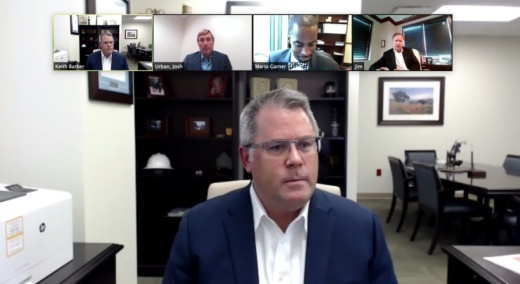Speakers at the virtual event—hosted by the Cy-Fair Houston Chamber of Commerce—included Keith Barber, CEO of the Houston Methodist Willowbrook Hospital; Jim Brown, CEO of HCA Houston Healthcare's North Cypress Hospital; Mario Garner, president of CHI St. Luke's Health—The Vintage Hospital; and Josh Urban, senior vice president of community hospital operations with Memorial Hermann Health System.
With COVID-19 hospitalizations up, the Willowbrook hospital is able to "flex up" medical surge units into expanded intensive care units, Barber said. The number of ICUs at the hospital has nearly doubled at times, he said. At Memorial Hermann, Urban said officials have started expanding beds into nontraditional parts of the hospital, such as recovery rooms, as well as some operating rooms and endoscopy suites.
Some of the panelists reported an increase in staff absenteeism caused by illness. To increase staffing levels, several of the hospital systems have begun using national organizations to help bring in contractors from outside of Houston, importing nurses from areas that are less affected by the pandemic.
"We eliminated all outside contract labor in the beginning to protect and preserve jobs for our own team," Brown said. "At this point, we're now calling on more national contractors to help us manage absences caused by community spread."
Brown pointed out all four panelists are part of larger hospital systems, which he said provides major benefits when it comes to leveraging those systems for resources.
"The strength of our supply chains benefits us greatly in a situation like this," Brown said. "Thus far, to my knowledge, we have not seen some of the challenges that might be fought in rural areas or areas with health systems not to this scale."
The four panelists each stressed hospitals are safe and urged people not to delay critical appointments, a call that has also been echoed recently by the head of the Houston Fire Department, which has reported an increase in at-home deaths. Leaders at each hospital said it has been standard practice to separate COVID-19 patients from non-COVID-19 patients in an effort to keep the virus from spreading within hospital walls.
"When we shut our procedures down in April and then started opening up in May and June, we saw serious issues from people who delayed care in that month," Barber said. "As we’re going through this again, we’re thinking about simultaneously taking care of COVID patients but also taking care other diseases so people aren’t creating larger, acute situations that are harder to recover from later on."
Throughout the discussion, Barber stressed the importance of having a unified plan where the broader community all works together to slow the spread of the virus. People were unified in the early stage of the pandemic, he said, but started going in different directions around June.
"I think we’ve really payed for that as a community and as health care providers," he said. "The biggest thing we’re learning is how important it is to have a unified plan. There’s opportunity as a metro area for us to be more unified in how we handle this pandemic."
Each panelist stressed the importance of wearing face coverings as a part of that unified plan, in addition to other common methods such as social distancing and hygiene. Urban said the unity toward the beginning of the pandemic came in part from shutdown orders put in place at the county level—something both Houston Mayor Sylvester Turner and Harris County Judge Lina Hidalgo have advocated bringing back but Gov. Greg Abbott has opposed. However, Urban stopped short of calling for a second shutdown.
"I’m not suggesting another shutdown, but if we could all do our part to follow those rules, I really do think that is what can bend the curve downward because we’ve seen it work a few months ago," he said.
Moving forward, Barber said one of the bigger challenges involves taking care of physicians, nurses and staff members who have been overexerted for going on four months. HCA has created A teams and B teams designed to give people a chance to rest, Brown said. Memorial Hermann and Houston Methodist have both created committees focused specifically on the people side of the business and staff morale.
"People are getting worn out and tired and don’t necessarily see the light at the end of the tunnel," Urban said. "We're asking staff to stretch beyond what they usually do ... and that creates stress for our physicians too."
The pandemic has long-term implications that go far beyond the direct care of patients, including how children are educated, people's ability to earn a wage and the need for social services, Urban said. Those issues all have connections to the health care sector as well, he said.
"I think that will have a long-term affect on the community that will be important for all of us to continue to focus on, outside of providing acute care services," he said.





